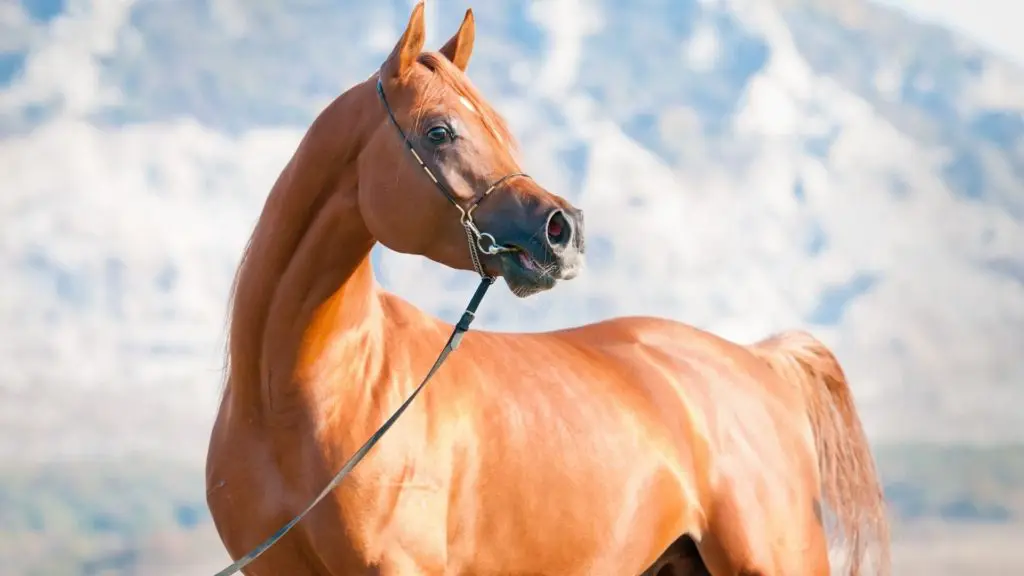Last updated: April 5, 2024
As a horse owner and author immersed in the horse world, I’ve always been drawn to the allure of the Arabian horse. There’s something magical about them—their storied past, breathtaking elegance, and that spirited yet gentle nature that seems to capture the essence of horses.
Arabians aren’t just horses; they’re living art, a testament to the bond between humans and horses that spans millennia. In this piece, I share with you the journey of the Arabian horse, tracing its origins, celebrating its unique characteristics, and honoring its impact on horse breeds around the globe. Join me as we explore the legacy of the Arabian, a breed that continues to enchant and inspire horse lovers everywhere.

The Arabian’s Desert Origins: A Glimpse into History
The saga of the Arabian horse begins in the arid expanses of the Arabian Peninsula. Believed to have been bred by the Bedouins as early as 3000 B.C., these horses were cherished for their beauty, hardiness, and stamina, traits honed by the unforgiving desert environment.
The Arabian’s storied lineage is meticulously preserved through detailed pedigrees, underscoring the breed’s significance in Bedouin culture. Arabian horses were integral to the nomadic lifestyle, serving as war mounts and means of transportation, and they even shared their owners’ tents, a testament to their valued status.
Their renown spread far beyond the desert sands, capturing the interest of historical figures such as Genghis Khan and George Washington and influencing various horse breeds worldwide.

Notable Arabian in History
Napoleon Bonaparte’s favorite horse was an Arabian named Marengo, named after the Battle of Marengo, through which it carried Napoleon to victory. Marengo became famous for its exceptional bravery and endurance, carrying Napoleon in several critical battles.
Despite being wounded multiple times, Marengo survived and symbolized the Arabian breed’s resilience and loyalty. This storied horse exemplifies the Arabian breed’s significant impact on history. You can read more about war horses in this article: Top 10 War Horse Breeds.

Physical Traits: The Signature of the Arabian Horse Breed
The Arabian horse breed, with its distinctive physical features, stands as a testament to beauty and versatility, setting it apart from other breeds:
- Weight and Height: Typically weighing between 800 to 1,000 pounds and standing 14 to 16 hands (56 to 64 inches) tall, Arabians strike a perfect balance between strength and grace. This optimal size contributes to their agility and stamina, making them ideal for endurance riding, where they often outperform larger breeds.
- Build: Arabians feature a compact, lithe body, a small, wedge-shaped head with a distinctively dished facial profile, large expressive eyes, and flared nostrils, all contributing to their alert and intelligent appearance. Their long, arched necks add to their noble stature and facilitate a greater range of motion, enhancing their performance in disciplines that require elegance and precision, such as dressage and show jumping.
- High Tail Carriage: The Arabian’s high tail carriage is not just a striking visual feature; it reflects the breed’s spirited and energetic nature. This characteristic, combined with their majestic appearance, makes them stand out in the show ring, captivating judges and spectators alike.

Arabian Horse Colors, Markings, and Genetic Traits
The Arabian horse’s coat colors and markings are as distinctive as their physical build, contributing to the breed’s captivating beauty. Arabians are predominantly found in bay, gray, chestnut, black, and roan hues. These primary colors may be accented with white facial markings and socks or stockings on their legs, adding to their striking appearance.
- Purebred Coloration: It’s crucial to understand that purebred Arabians do not carry dilution genes, which means you won’t find them in dun, cremello, palomino, or buckskin colors. This genetic purity adds to the breed’s allure and mystique, ensuring that the Arabian’s traditional colors are preserved through generations.
- Skin Pigmentation: Another unique aspect of the Arabian horse is its black skin, which serves as a natural defense against the harsh desert sun. This dark pigmentation is present even beneath white markings, offering protection and contributing to the breed’s adaptability to various climates.
- Genetic Traits: Beyond their stunning colors and markings, Arabians carry certain genetic traits that further distinguish them. While they are known for their health and longevity, the breed can be predisposed to specific genetic conditions. Awareness and responsible breeding practices are essential to maintaining the health and vitality of Arabian horses.

The Arabian Temperament and Uses
Sure, the Arabian is physically appealing, but it is a horse with a remarkable temperament and exceptional versatility. Renowned for their intelligence, sociability, and sensitivity, Arabian horses possess a unique ability to form deep, meaningful bonds with their handlers.
They thrive under respectful and knowledgeable training, showcasing a spirited nature that, while requiring an experienced hand, makes them exceptionally loyal and affectionate companions.
Temperament
The Arabian horse’s intelligence, sociability, and sensitivity make it a breed apart. These horses form deep bonds with their handlers and respond best to respectful and knowledgeable training.
Their spirited nature demands an experienced hand, yet in the right environment, Arabians are loyal, affectionate companions that enrich the lives of those around them.
For novice equestrians, the Arabian’s sensitivity and intelligence pose a unique challenge. It requires an honest assessment of your riding and handling skills. Beginners might find a seasoned Arabian or a different breed more manageable.
However, with access to the right resources and a commitment to positive, consistent training methods, owning an Arabian can be a deeply rewarding experience.
Uses and Versatility
Beyond their role as companions, Arabians are incredibly versatile and are one of the most intelligent horse breeds. They excel in various disciplines that showcase their endurance, agility, and elegance. They are the breed of choice for endurance riding, capable of covering long distances over challenging terrain.
Arabians also shine in the show ring, in events such as dressage with graceful movements, and even in Western pleasure classes. Their athleticism and spirit make them competitive on the racetrack, and their gentle nature makes them excellent family horses and trail companions.
Notable Arabian Horses in Sports History
- Witez II: A legendary Arabian stallion known for his incredible journey during World War II and later contributions to American Arabian horse breeding.
- Khedive: An influential Arabian in dressage, showcasing the breed’s capability in high-level dressage competitions.
- El Mokhtar: Star of the movie “The Black Stallion Returns,” known for his beauty and spirit, capturing the hearts of audiences worldwide.
Their ability to adapt to various equestrian disciplines while maintaining their characteristic grace and loyalty makes them a cherished horse breed.

The Arabian’s Influence on Other Horse Breeds
A remarkable aspect of the Arabian horse’s legacy is its foundational role in creating other horse breeds, notably the Thoroughbred. Every Thoroughbred traces its lineage to one of three Arabian studs: the Byerley Turk, the Darley Arabian, and the Godolphin Arabian.
These Arabians were instrumental in developing the Thoroughbred breed, known today for its racing prowess. This influence extends beyond Thoroughbreds, with Arabians contributing to the genetic makeup of breeds like the American Quarter Horse and the Morgan. Their traits—intelligence, endurance, and distinctive beauty—have been sought after to enhance various horse breeds worldwide.
A Living Legacy
The Arabian’s contribution to horse breeding underscores its enduring impact on equestrian sports and leisure riding. Recognizing this shared heritage enriches our appreciation of the Arabian horse and its role in the broader equine world.
Health and Care of Arabian Horses: A Closer Look
Arabian horses are known for their elegance, intelligence, and endurance, but like all breeds, they have specific health considerations that owners should be aware of. Addressing these concerns with preventive care and informed management can ensure these magnificent animals lead long, healthy lives.
Common Health Issues:
- Severe Combined Immunodeficiency (SCID): This genetic disorder leaves foals without a functioning immune system, making them highly susceptible to infections. Testing and responsible breeding practices are crucial to prevent the propagation of this condition.
- Lavender Foal Syndrome (LFS): Characterized by neurological issues in newborn foals, LFS can be fatal. Genetic testing of breeding stock helps identify carriers and avoid producing affected offspring.
- Cerebellar Abiotrophy (CA): This condition affects a foal’s balance and coordination. While there’s no cure, genetic testing allows breeders to identify carriers and make informed breeding decisions to reduce the incidence of CA.
Diet and Nutrition:
A balanced diet is essential for maintaining an Arabian’s health. They thrive on quality hay, fresh grass, and grains, with careful monitoring to prevent overfeeding. Given their desert origins, Arabians may require less feed than other breeds of similar size. Always ensure access to clean, fresh water and minerals.

Preventive Care:
- Regular Veterinary Check-ups: Routine exams can catch health issues early, ensuring your Arabian receives timely treatment.
- Vaccinations and Deworming: Follow a regular vaccination schedule and deworming program to protect against common equine diseases and parasites.
By understanding and addressing the specific health needs of Arabian horses, owners can enjoy the companionship of these beautiful animals for many years. Emphasizing preventive care, responsible breeding, and attentive management will help mitigate health risks and ensure the well-being of this cherished breed.
Grooming and Daily Management of Arabian Horses
Proper grooming and daily management are essential for maintaining the health and appearance of Arabian horses. These practices enhance the horse’s beauty and provide an opportunity to check for any health issues or injuries. Here are some key aspects to consider:
Grooming Practices:
- Coat Care: Regular brushing helps remove dirt, dust, and loose hair, promoting a healthy and shiny coat. Use a soft-bristled brush for sensitive areas and a curry comb for the body to stimulate circulation.
- Mane and Tail Maintenance: The mane and tail of Arabian horses can be particularly luxurious. Use a detangler and a wide-tooth comb to gently remove tangles without causing breakage. Regular trimming can help maintain a neat appearance and prevent knots.
- Bathing: While not needed daily, a bath can refresh your Arabian’s coat, especially during warmer months. Use a mild equine shampoo and ensure you rinse thoroughly to prevent skin irritation.
Hoof Care:
- Daily Checks: Inspect your Arabian’s hooves for stones, debris, or signs of disease like thrush. This daily routine helps prevent lameness and other hoof-related issues.
- Regular Trimming and Shoeing: Schedule regular visits from a qualified farrier to trim the hooves and, if necessary, adjust or replace shoes. Proper hoof balance and shape are vital for your horse’s overall mobility and health.
Skin Care:
- Sun Protection: Arabians, especially those with white markings, can be susceptible to sunburn. Applying sunblock to sensitive areas, like the nose, can prevent burns and discomfort.
- Insect Management: Use fly sprays or sheets to protect your Arabian from biting insects, which can cause irritation or spread disease.
Special Considerations for Arabian Horses
- Adaptation to Climate: Due to their desert ancestry, some Arabians may require additional care in colder climates, such as extra shelter or blanketing.

Arabian Stallion in halter. Source: Ealdgyth, CC BY-SA 3.0
Owning an Arabian Horse
Are you considering an Arabian horse as your next equine partner? Remember that their spirited nature and intelligence require an experienced hand, yet the rewards of companionship with an Arabian are unparalleled.
Embracing the journey of Arabian horse ownership involves more than just the initial purchase. Prospective owners should prepare for the costs of tack and stable supplies and the ongoing costs of feed, veterinary care, farrier services, and possibly boarding fees.
Understanding and committing to the financial aspects of horse ownership ensures that your Arabian thrives under your care, providing a rewarding experience for the horse and owner.

Frequently Asked Questions About Arabian Horses
How much does an Arabian horse cost?
The cost of Arabian horses varies widely, typically ranging from $3,500 to $20,000. Factors influencing the price include age, training, conformation, and pedigree.
How long do Arabian horses live?
Arabian horses have an average lifespan of around 28 years, which is consistent with the lifespan range for light horse breeds. This longevity reflects their hardiness and is an important consideration for anyone considering buying a horse.
Are Arabian horses faster than Thoroughbreds?
While Arabian horses are known for their speed and athleticism, they are not faster than Thoroughbreds on standard racing tracks. Arabians excel in endurance races over long distances, showcasing their stamina and agility.
In Conclusion: The Timeless Appeal of the Arabian Horse
The Arabian horse embodies the essence of equine beauty and versatility. From their ancient desert origins to their modern-day achievements in various equestrian disciplines, Arabians continue to inspire and captivate.
Whether you’re an experienced equestrian or an admirer of horses, the Arabian horse breed represents a pinnacle of horse breeding, a living legend that continues to gallop through the annals of history.
Join the Conversation and Stay Connected
We’re not just sharing information but building a community of horse enthusiasts. Here’s how you can be a part of it:
- Share Your Thoughts: Got insights, experiences, or questions about Arabian horses? Drop a comment below. Your input enriches our collective knowledge and helps others learn from your experiences.
- Spread the Love for Horses: If you found this article enlightening, share it with fellow horse lovers. Use the social share buttons below to spread the word and celebrate the majestic Arabian horse.
- Stay Updated: Stay updated on the latest in the world of horses. Subscribe to our newsletter for regular updates, exclusive content, and more horse-related fun delivered to your inbox.
- Follow Us: Join our vibrant community on social media! Follow us on Facebook, and Twitter for daily doses of breathtaking horse photos, care tips, and behind-the-scenes looks at the life of Arabian horses.
By engaging with our content and joining our social circles, you’re not just a reader; you’re a valued member of our horse-loving family. Let’s embark on this journey together, exploring the legacy and beauty of Arabian horses and beyond.
Additional Resources
For those interested in delving deeper into the world of Arabian horses, the following resources provide valuable information and insights:
- Arabian Horse Association (AHA): Discover more about the breed standards, history, and activities related to Arabian horses.
- Journal of Equine Veterinary Science (JEVS): Access articles on Arabian horse health, genetics, and physiology for a scientific perspective.
- United States Equestrian Federation (USEF): Explore the USEF’s role in equestrian sports, including events and competitions featuring Arabian horses.
- ScienceDirect: Find comprehensive scientific research papers on Arabian horse genetics, behavior, and breed-specific characteristics.
Meet Miles Henry
An avid equestrian and seasoned racehorse owner, Miles Henry brings his extensive experience to the equine world, proudly associating with the AQHA, The Jockey Club, and various other equine organizations. Beyond the racetrack, Miles is an accomplished author, having published various books about horses, and is a recognized authority in the field, with his work cited in multiple publications.
🔗 Connect with Miles:
Twitter
Facebook
YouTube: Check out race highlights, horse care tips, and more!

